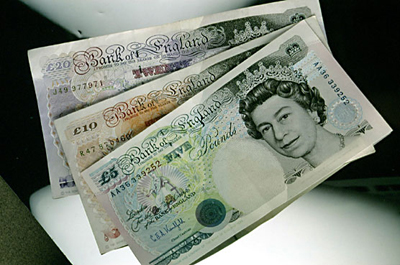Tuesday, 17 March 2015 17:21
 LONDON: Sterling fell back against both the euro and the dollar on Tuesday, feeling more pressure from a darkening political outlook ahead of a general election due in May.
LONDON: Sterling fell back against both the euro and the dollar on Tuesday, feeling more pressure from a darkening political outlook ahead of a general election due in May.
Latest opinion polls have pointed to a ‘hung parliament’, in which neither of the two major parties is able to form a government on its own after the May 7 vote.
Opposition Labour leader Ed Miliband also ruled out what had looked like one of the possible options, a formal coalition with the pro-independence Scottish National Party, although he did not rule out a looser post-election pact.
Banks and trading houses have issued a raft of research notes warning of the potential impact of political instability on a UK economy struggling with enormous fiscal and current account shortfalls, and sterling has suffered against the broadly strong dollar as a result.
“There is selling pressure on sterling due to the election,” said Hans Redeker, Head of Global FX strategy at Morgan Stanley in London. “Can you have the luxury of a hung parliament when you have very difficult economic challenges to face? That is of concern to the market and is hurting sterling going into the event.”
Sterling fell 0.3 percent to $ 1.4789 and around half a percent against a broadly stronger euro at 71.69 pence.
Sterling had hit a five-year low of $ 1.4699 on Friday, hurt by comments from Bank of England Governor Mark Carney signalling that he was in no hurry to raise interest rates. Recent gains by the pound against the euro can keep inflation low and therefore the BoE can put off rate hikes, he said.
Traders will look closely on Wednesday at UK earnings data, which the BoE has said is an important factor in its considerations on when to raise interest rates.
FUNDING C/A DEFICIT
Redeker said inflows into the gilt market, where investors can get some return for their money in comparison to rock bottom or negative yields on euro zone government debt, was becoming of increasing importance to the funding of the UK’s external deficit.
Analysts from French bank BNP Paribas, in a special report discussing the issues around the election, also highlighted the risks to foreign direct investment posed by a referendum on Britain’s membership of the European Union promised by the governing Conservatives if they win re-election in May.
“A referendum ‘hit’ to confidence and UK foreign direct investment (FDI) would be gamechanging,” BNP strategist Phyllis Papadavid wrote. “FDI is a key funding flow of the current account deficit. Re-negotiation of this relationship would jeopardise the GBP’s long-term valuations.”
Copyright Reuters, 2015



























